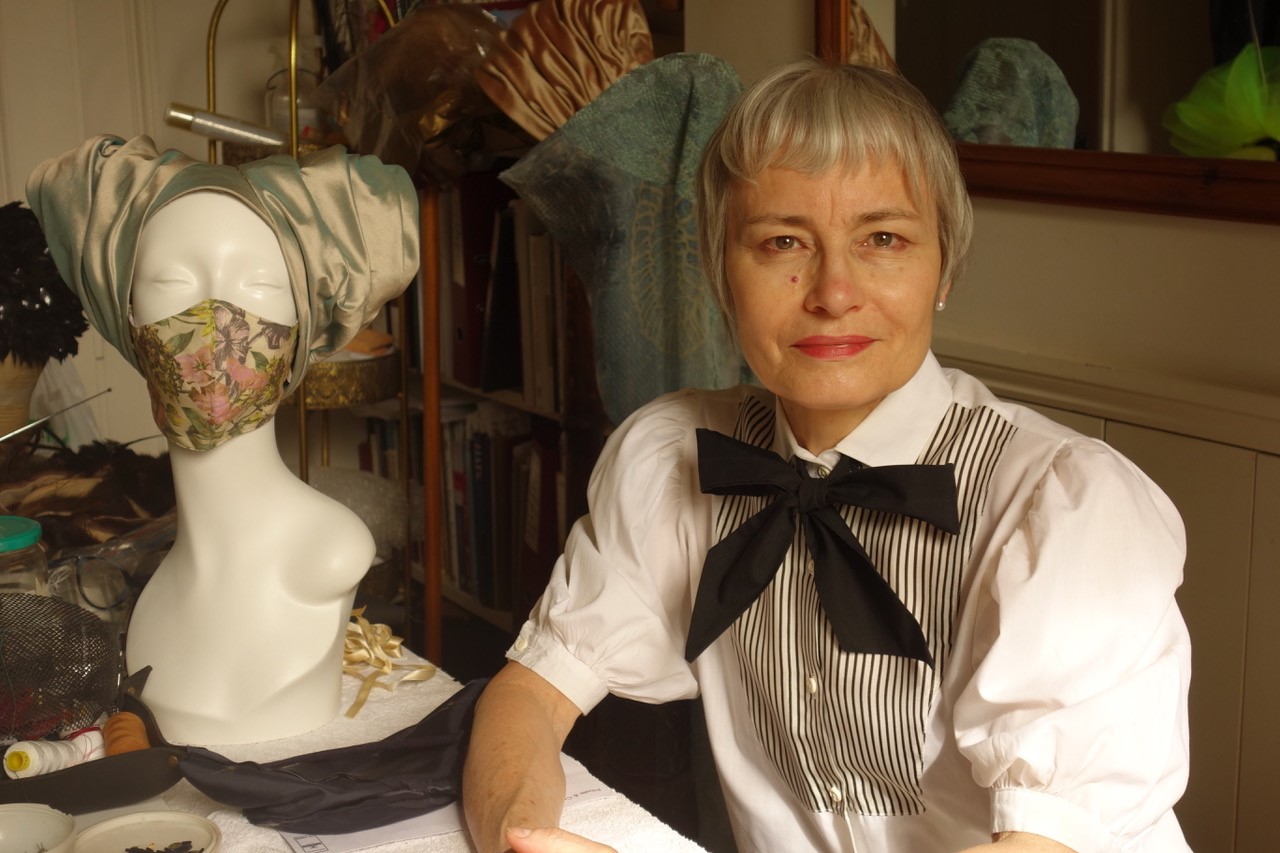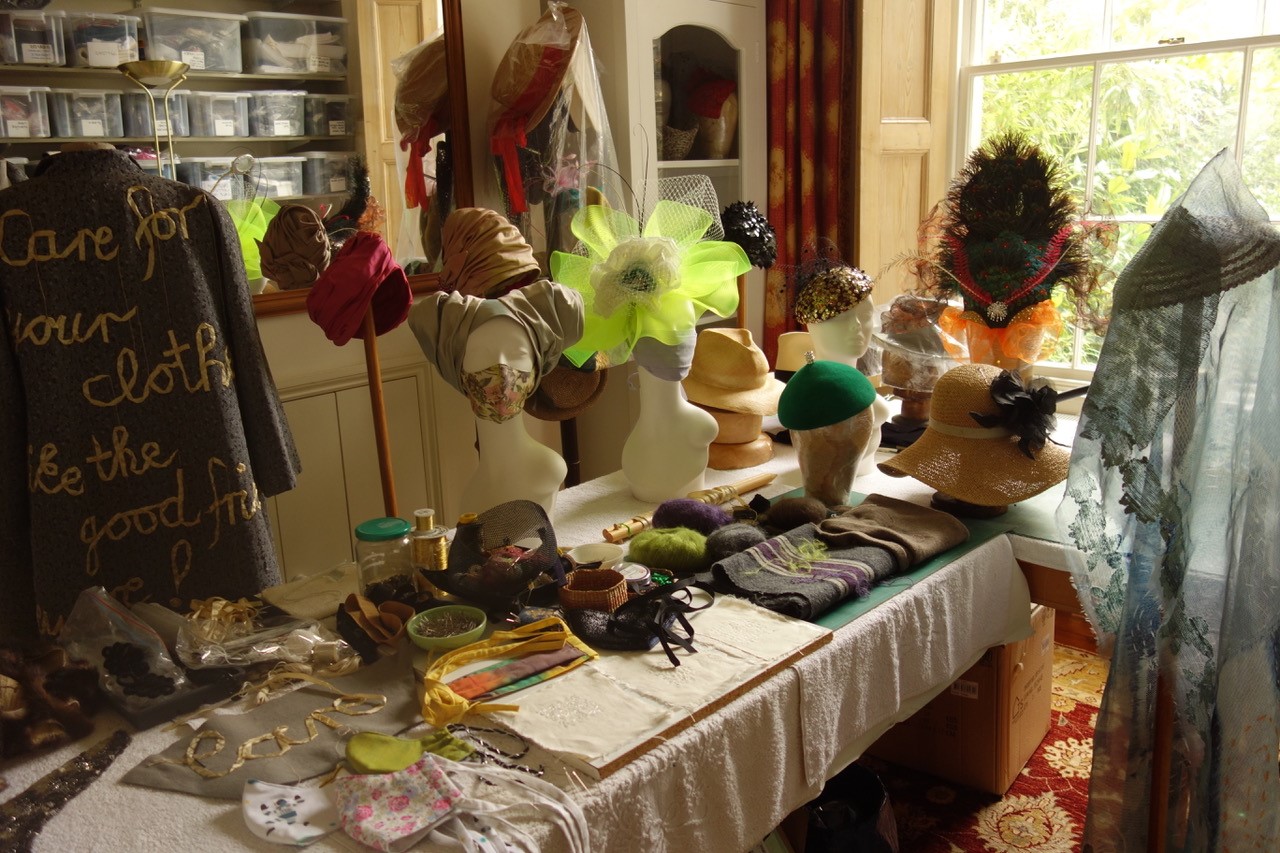“I’ve always worked in declining markets. I feel I always have to reorientate myself, but this suits me. (...) I quite like the idea of being on my toes, changing with the flow.”
Dorit Young describes herself as a one-woman show. An apprenticeship-trained couture milliner, designer and founder of the Clothes Clinic, she seeks to find a new exciting craft venture which will bring together her passions of sustainable fashion and for protecting the rich intangible craft heritage.

Tell us about your work and practice.
I have always done a lot of work with my hands as a child, I like sewing, and I always liked crafting. And when another career line failed, I thought back that I wanted to learn a craft, and I started working at the German Theatre, in the millinery department, making hats. I then did an apprenticeship in Germany, and afterwards I came to London and worked for some of the top designers in their fields. I did this for 20 years, and then I had enough and separated myself, and since then I do freelance work. In the meantime, I also did a BA in Fine Arts - Textiles, and an MA in Critical Fashion.
My everyday work is varied. I make couture hats by commission, but this has become quite rare, and I'm not so keen on doing big, one-off couture hats for Ascot. I'm much more interested in making everyday hats, but beautifully crafted, which people love, which they wear, and if they show signs of wear they can be repaired or slightly altered.
Parallel to that, to supplement my income, I started a Clothes Clinic a few years ago. At least two generations of women have lost the skill and the interest in repairing clothes, because it's much easier to buy another outfit and bin your present clothing. But I think this is very much against the zeitgeist of our environmental issue, so I started running the Clothes Clinic in a local shop, teaching people how to repair clothes. I do only hand-stitching because I think there’s quite a threshold to using a sewing machine - not everybody has one and it's an investment, whereas with hand-stitching you can do so much and anyone can learn it. I’m always interested in reaching the biggest possible group of people.
Then, when the lockdown started, I followed my gut feeling, and realized right from the start that we would need masks, so I started making them, playing around with patterns, and showed them to friends, and put some in my front room window. I was making them for free for vulnerable people, key workers, teachers, nurses. I never bought a single piece of fabric. You only need a scrap to make a mask, so I sent out a request for men’s shirting, good cotton bedding, any kind of good quilting cotton, and I mobilized my friends, and then they mobilized their friends and I got parcels all through the lockdown. Until now I haven’t bought a single piece of fabric. And that’s really important for me.
What are the main challenges in your work?
I think one of the biggest challenges is that I’ve always worked in declining markets. I feel I always have to reorientate myself, but this suits me. I couldn't do the same product for years on end. Of course I can evolve it, but I quite like the idea of being on my toes, changing with the flow.
Also, because I have always been a one-woman show, it would be really interesting to connect with people, but that's also a challenge - the work I do takes a lot of time, so it is difficult to find the additional time for connection.
Another challenge is that repairing clothes is not a sexy thing to do. Of course there’s a niche market of people who are environmentally conscious, but that's a very small section of our society. And most people think stitching up a button or taking up the hem takes 5 minutes. It’s a complete misconception, nothing takes 5 minutes. This is a whole relearning process that should start in schools, it should start at the bottom of education, making children familiar with the thought that you have to look after the clothes you wear; you can’t just abuse them, they're an environmental resource. This re-education towards a reappreciation of clothing is a really big challenge as well.

How do you think international collaboration will impact your work?
It would open my mind, from working as a one-woman shop to possibly becoming part of a much much wider international community. I think generally, any kind of joining, any community, any kind of opening up to other countries is absolutely important and beneficial. You have to learn from each other, you have to grow with each other.
Have you learned anything surprising about Romanian craft?
Not only has Romania got a fantastic craft tradition, but I feel that they're still a bit closer to it. The rediscovery of Romanian crafts and combining them with modern attitudes - I feel Romania is a great starting point. You still have people in villages who practice crafts, and you can still just extract the knowledge.
How do you see the future of craft and your work in a post Covid-19 world?
I'm very hopeful. Especially with the lockdown, people have been looking more inwards, into their home. They started gardening, knitting, took up various crafts. How much of that will stay with us, time will tell. But I do think that with the increasing environmental crisis, people are questioning where their clothes are from, they are becoming more and more unhappy with mainstream places; I think they're on the right path, but this needs more support.
What advice would you give other craft practitioners who are trying to adapt?
Stay open and stay flexible. You have to look for new opportunities, stay close to your community, use the resources that are there - don't think you have to use the latest materials or the latest technologies. Find the happy medium between your own intuition, your own history and then look to modern technology. It has to be a combination - one is feeding off the other. Flexibility is also incredibly important, because our world has been changing so rapidly within the last two years. My daughter is 24, and she will be growing up in a very different world to my world, and in a much less secure world - climate-wise, pollution-wise. Also try to join a group, don't work on your own too much. Look outside of your box.
Crafting Futures is a global British Council programme building a positive future by unlocking craft’s unique potential to inspire people around the globe. The programme celebrates the value of craft in our history, culture and world today.
Through making and international collaboration, Crafting Futures brings together craft practitioners, designers and organisations from around the world to explore possibilities for this future together.
Launched in Romania in 2020, Crafting Futures brings together six craft professionals from the United Kingdom and organisations, designers, artists and craftivists in Romania, aiming to support the development of shared learning and traditional, sustainable craft and design practice.
https://www.britishcouncil.ro/en/programmes/arts/crafting-futures
